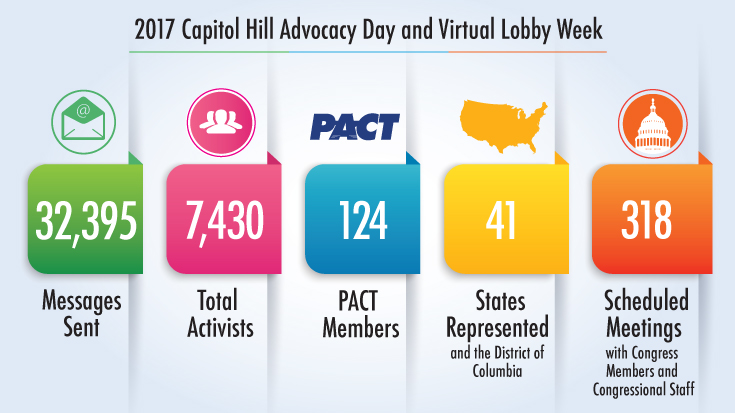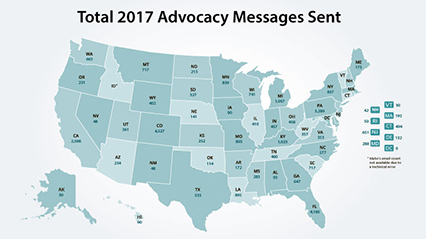
A total of 32,395 messages were sent with participation from 7,340 activists and 124 PACT members from 41 states plus the District of Columbia. Through the help of these individuals, 318 meetings were scheduled with members of Congress and their Congressional staff.
These are the final stats on our 2017 Capitol Hill Advocacy Day and the Virtual Lobby Week that preceded it. The stat results show the dedication and enthusiasm AARC members have for our annual trip to Washington, DC, to visit with members of Congress about issues important to respiratory therapists and the patients who depend on our services.
They know who we are

Why go up Capitol Hill every year?
By visiting Washington, DC, en masse once a year, the AARC is helping to ensure that members of Congress know who RTs are and what they do – a familiarity that proves invaluable throughout the year as the AARC addresses fast moving developments with the potential to impact the profession.
“Our annual trek energizes our members and gives them an opportunity to educate leaders on the scope of the RT profession and to provide their personal stories on how their expertise has helped improve the outcomes of their patients,” says AARC Associate Executive Director for Advocacy and Government Affairs Anne Marie Hummel.
“It is a tribute and acknowledgement of the value of respiratory therapists when our lobbyists conduct follow-up meetings and are told they remember our RTs and the issues they discussed in those meetings.”
Progress to report
This year the mission was to lobby Congress for inclusion of respiratory therapists in any telehealth legislation that is introduced this year. Hummel reports progress was made. While the Medicare Telehealth Parity Act that the AARC supported in the last Congressional session may be broken into pieces when it is reintroduced – a move aimed at lowering the cost estimate for the bill by the Congressional Budget Office – reintroduction of the CONNECT for Health Act on May 3 bodes well for RTs.
“This bill would expand telehealth services in Medicare Advantage plans and other alternative payment models such as Accountable Care Organizations,” explains Hummel. “Although it still requires a health care professional enrolled as a Medicare provider to furnish telehealth services overall, the door is open for the possibility of RTs to be included down the road in Medicare Advantage plans based on a requirement in the bill that the Secretary seek public comment on additional telehealth benefits that may be included in such plans with respect to other licensed health care professionals with specialized training in accordance with State law.”
The second item on the AARC agenda – a request for a CMS analysis of claims data that could show the value of RTs in treating COPD patients in a variety of settings – saw forward movement as well.
“With a deadline the week of our meetings, we know of at least seven offices that were going to or did submit the request on our behalf,” says Hummel. She believes that level of support suggests there is a good chance the request will be included in the appropriations bill when it comes out.